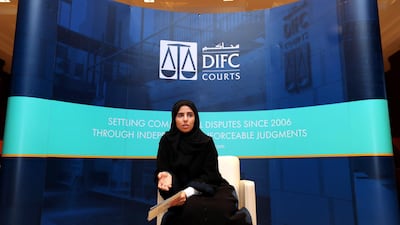Dubai International Financial Centre Courts, the international common law system of the emirate's financial free zone, recorded a 41 per cent year-on-year increase in the total number of commercial cases it handled in 2017.
The court handled 520 cases last year across all of its divisions, with claims at the main Court of First Instance (CFI) – including arbitration cases – rising to 54, up 17 per cent year-on-year, DIFC Courts said on Monday.
The total value of claims and counterclaims handled at the CFI was Dh471.2 million, down from Dh2.71bn in 2016, following the conclusion of large cases, and 88 per cent of claims were settled before having to go to trial, up from 83 per cent in 2016.
In addition, the total value of enforcement orders issued by DIFC Courts in 2017 - which also includes those received from other jurisdictions - rose 26 per cent to Dh3.4 billion from Dh2.75bn in 2016.
DIFC Courts does not break down caseload by subject or business category, but around 60 per cent of all 2017 cases were employment-related – the bulk of which were breach of contract disputes, Amna Al Owais, chief executive and registrar at DIFC Courts told reporters on Monday.
DIFC Courts is expanding its services as part of efforts to cement the zone's legal leadership in the region. Last year, it rolled out a specialised sub-division that will streamline the resolution of legal cases involving complex technology and construction disputes.
The specialist DIFC court created last September has yet to hear a case, Ms Al Owais said, explaining that the recovering economy may have reduced litigation within these industries.
There have yet to be any cases brought related to the trading of bitcoin or other cryptocurrencies, she added, “though DIFC Courts is equipped to handle these kind of disputes should they arise”.
The volume of cases at the Small Claims Tribunal, which was established in 2007 to handle cases under Dh1 million, stood at 363 in 2017 compared to 217 in 2016. The tribunal saw a marked increase in the total value of claims and counterclaims, which rose 75 per cent year-on-year to Dh36.2m, compared to Dh20.7m in 2016.
_______________
Read more:
DIFC Courts launches new technical and construction disputes court
DIFC Courts handled more, and more valuable, cases in 2016
New ADGM arbitration centre to be launched
______________
The settlement rate for cases at the SCT also rose significantly, to 85 per cent from 75 per cent in 2016, as businesses seek to resolve their disputes more rapidly.
In 2017, the SCT introduced a service whereby claimants can give defendants notice of a case via instant messaging, as part of DIFC Courts’ efforts to expand its legal e-services.
The body aims to be a "paperless court" by the end of 2018, Ms Al Owais said. In 2017, DIFC Courts set up a mobile-based online case management system to increase transparency and accessibility of court processes and case information, and struck a technology partnership with Microsoft.
The organisation also set up a "Court of the Future" initiative to study how legal cases may be processed in decades to come, for example by using blockchain ledger technology.

